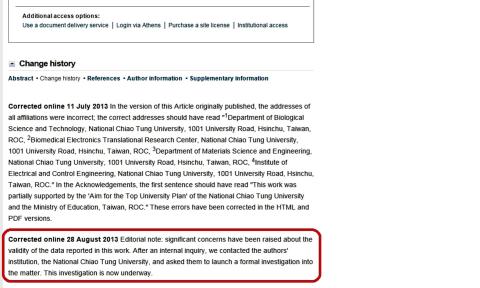The Ministry of Science and Technology yesterday said that leading international scientific journal Nature Nanotechnology has decided to retract from its Web site an article penned by National Chiao Tung University professor Steven Huang (黃國華) and his student Chen Yu-hsiun (陳昱勳) on DNA polymerase genome sequencing over doubts from international academic circles about the validity of the pair’s research.
Deputy Minister of Science and Technology Lin Yi-bing (林一平) said the ministry earlier this week received an e-mail from the journal’s staff about the decision.
He said that an ad hoc task force at the ministry probing the case deemed the research “highly likely to be forged” and has made a suggestion to the ministry’s academic ethics committee to punish Huang and Chen, asking that the pair’s right to apply for any further project overseen by the ministry be suspended for 10 years and five years respectively.

Screen grab from Nature Nanotechnology Web site
“Huang and Chen were unable to replicate the results of their project and failed to present the tools they claimed to use,” Lin said.
Arrangements are being made for the committee to convene, and the pulling of the pair’s article would greatly influence the verdict; however, it is still premature for any conclusions to be made, he said.
Huang and Chen last year submitted the writing on their research, which Huang claimed would greatly speed up the process of virus genome sequencing — from at least one day for every virus to one hour — thus significantly reducing the time and cost required for developing new vaccines and antivirals.
Huang said that his method was “more affordable, accurate and faster” compared with traditional means.
However, since the duo’s research was published by the journal in May last year, academics worldwide have called into question its methodology and legitimacy, saying that its results were “too perfect.”
“The data looks so good that others are wondering whether [the] researchers had help from God. If not, their paper would be worthy of Nobel Prizes from all branches of science. Strangely none of those critical breakthroughs are described in the paper,” said an unnamed contributor on online bioinformatics blog Homolog.us.
Other critics of the allegedly forged research include US scientist Stuart Lindsay, a professor of single molecule biophysics at Arizona State University, who questioned the “superconducting materials” the duo claimed to use to simulate the qualities of DNA polymerases — enzymes in human cells that are essential for DNA replication — saying: “None of us know of a superconducting material that works at the same temperature as a polymerase.”
Superconductors work at temperatures well below freezing, with even superconductors that operate at higher temperatures only beginning to react at about -135?C, while polymerases generally operate at about room temperature, he said.
Huang and Chen could not be reached for comment.

ENDEAVOR MANTA: The ship is programmed to automatically return to its designated home port and would self-destruct if seized by another party The Endeavor Manta, Taiwan’s first military-specification uncrewed surface vehicle (USV) tailor-made to operate in the Taiwan Strait in a bid to bolster the nation’s asymmetric combat capabilities made its first appearance at Kaohsiung’s Singda Harbor yesterday. Taking inspiration from Ukraine’s navy, which is using USVs to force Russia’s Black Sea fleet to take shelter within its own ports, CSBC Taiwan (台灣國際造船) established a research and development unit on USVs last year, CSBC chairman Huang Cheng-hung (黃正弘) said. With the exception of the satellite guidance system and the outboard motors — which were purchased from foreign companies that were not affiliated with Chinese-funded

PERMIT REVOKED: The influencer at a news conference said the National Immigration Agency was infringing on human rights and persecuting Chinese spouses Chinese influencer “Yaya in Taiwan” (亞亞在台灣) yesterday evening voluntarily left Taiwan, despite saying yesterday morning that she had “no intention” of leaving after her residence permit was revoked over her comments on Taiwan being “unified” with China by military force. The Ministry of the Interior yesterday had said that it could forcibly deport the influencer at midnight, but was considering taking a more flexible approach and beginning procedures this morning. The influencer, whose given name is Liu Zhenya (劉振亞), departed on a 8:45pm flight from Taipei International Airport (Songshan airport) to Fuzhou, China. Liu held a news conference at the airport at 7pm,

AIR SUPPORT: The Ministry of National Defense thanked the US for the delivery, adding that it was an indicator of the White House’s commitment to the Taiwan Relations Act Deputy Minister of National Defense Po Horng-huei (柏鴻輝) and Representative to the US Alexander Yui on Friday attended a delivery ceremony for the first of Taiwan’s long-awaited 66 F-16C/D Block 70 jets at a Lockheed Martin Corp factory in Greenville, South Carolina. “We are so proud to be the global home of the F-16 and to support Taiwan’s air defense capabilities,” US Representative William Timmons wrote on X, alongside a photograph of Taiwanese and US officials at the event. The F-16C/D Block 70 jets Taiwan ordered have the same capabilities as aircraft that had been upgraded to F-16Vs. The batch of Lockheed Martin

GRIDLOCK: The National Fire Agency’s Special Search and Rescue team is on standby to travel to the countries to help out with the rescue effort A powerful earthquake rocked Myanmar and neighboring Thailand yesterday, killing at least three people in Bangkok and burying dozens when a high-rise building under construction collapsed. Footage shared on social media from Myanmar’s second-largest city showed widespread destruction, raising fears that many were trapped under the rubble or killed. The magnitude 7.7 earthquake, with an epicenter near Mandalay in Myanmar, struck at midday and was followed by a strong magnitude 6.4 aftershock. The extent of death, injury and destruction — especially in Myanmar, which is embroiled in a civil war and where information is tightly controlled at the best of times —